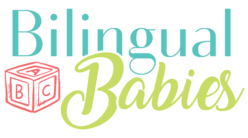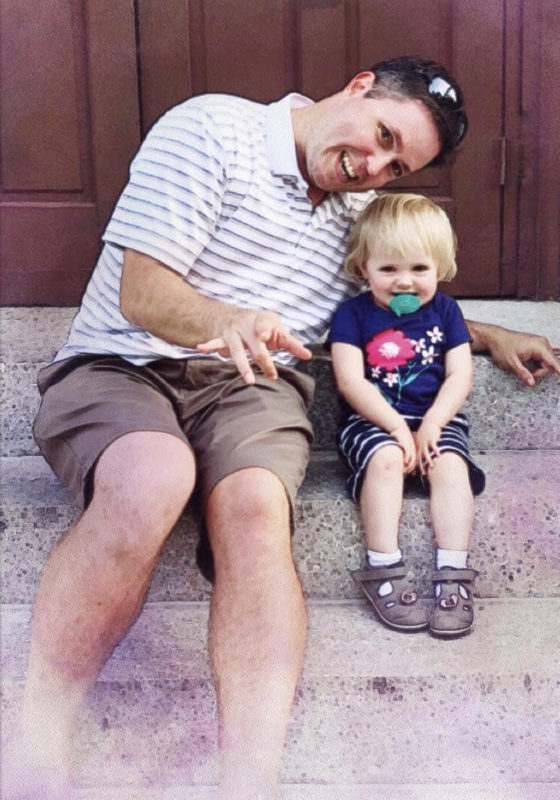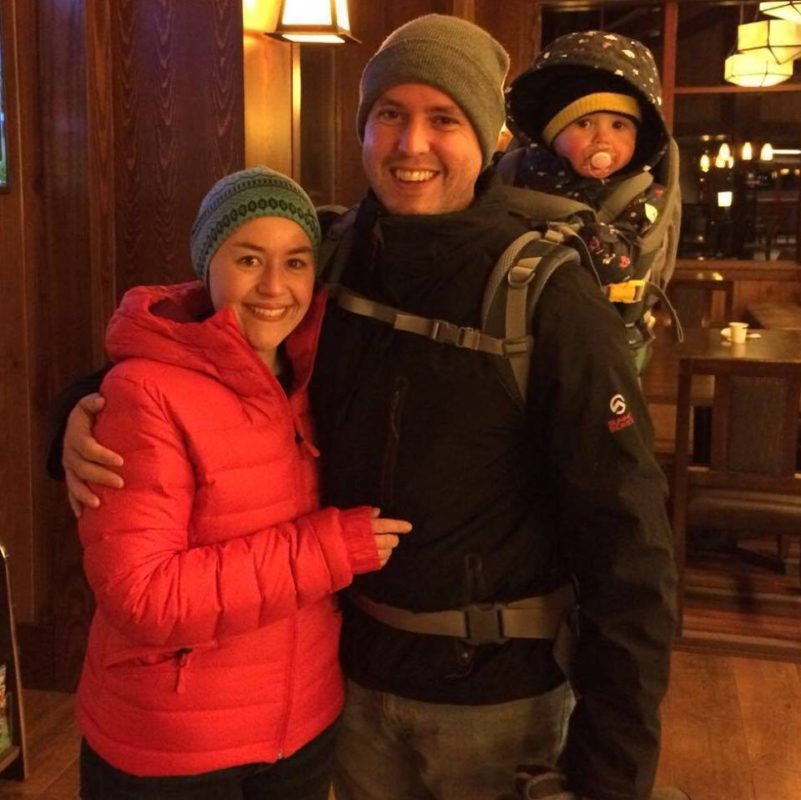- Location: USA
- Parents: Dad=English; Mom=German, English, Spanish
- Child: German, English & a bit of Spanish at daycare
Veronika: Alright, could you talk a little bit about how it has been been for you to raise a child with two languages? For me, it wasn’t really a conscious decision; it was just something I would do. It was clear all along. But with you being an English speaker with only minimal knowledge of German, how does that feel?
Additional languages are an asset!
Mike: Well, I think I naturally support it. I think this also has to do with my career path. I work with disability population; and so supporting unique differences and cultural differences, I love the benefit of speaking different languages as well as the cultural dynamic that goes with each and every language. I found that to be an incredible asset to our daughter’s life experiences. So I was very much in support of our daughter having the privilege of having a native German speaker as a mom who is also fluent in English and other languages. And my limited knowledge of Hawaiian, I thought that can only just supplement even more. So I saw that as a great opportunity for our daughter, something that I wish I had growing up.
Veronika: I remember like an incident last week when we were in the kitchen—I think—and I spoke to Ella in German and you chimed in and said, “English speaker here”. So how does it work on a daily basis for you with me trying to translate but sometimes forgetting?
Trust that your loved ones will not talk behind your back.
Mike: I think context is a big thing here. Before Ella entered the world, I probably hid behind some of these egotistical fears that you know “hey, mom and daughter are going to eventually speak behind my back in German”. In reality, that doesn’t happen. I think that just comes with being in a good family. You trust each other. But when I get back to context, I think a bit of that context was, you know, there’s a dialogue in German and then Ella is looking at dad like, “Hey! What? You don’t understand?” And then I’m like, “Hey! Native English speaker here; I don’t quite understand what was…”. So I think the big thing is trust. I never feel like I have to worry about trust because German is not being treated as some hidden thing to use behind dad’s back. It feels like a supported thing by everyone in the household. And so I think context-wise is just maybe that one moment where you kind of felt like I was supposed to understand German when I really didn’t.
Veronika: Yeah. Does it actually like help you if I say stuff in German first and then repeat it in English?
I learn if you say things in German and then again in English
Mike: Yes, and for the record—we have had this conversation before—I love when we—I have made subtle attempts to try and learn more German and when you say things in English and then German or German and then English or put post-its on the furniture or whatever, it very much helps me out and makes me focus on learning the language which in the day to day grind sometimes I will forget. But obviously that can be a major task to constantly train somebody in German throughout the normal life experiences.
Veronika: I think you’ve got a lot better in German since.
Mike: Dankeschön. Danke! Isn’t this where you say bitte?
Veronika: Bitte! Yeah. So if you think about other dads who might be in a similar situation, what piece of advice would you give them; like what do you regard as most important in this journey?
Putting our kids in a better position than we were in
Mike: I think if anything this goes hand in hand with what all parents always strive to do. At least from my limited experience with only having a 2 year old and what I’ve picked up from observing parents and being a teacher is we always try to make a better world for our kids. And in my opinion, if my child is able to speak multiple languages, to better understand more people on this planet, I think that is a great step towards putting our child in a better position than we were in. When I think through my life experiences, there are just countless opportunities to where I wish I knew Spanish or German or French or whatever. Life experiences didn’t really pan out their way for me and I hope it’s a different story for Ella.
Veronika: Can you see potential challenges that may be in the way that she grows up with multiple languages?
Of course, challenges do exist
Mike: Of course. Lack of exposure. If there’s one thing I’ve learned from studying Hawaiian when I went to the University of Hawaiʻi was immersion is an incredible educational tool; and if you’re not immersed in it, why use it? And whenever I go visit Germany with you, your bunch of Germans who are required to study English; so they have a foundational understanding, but in day to day society they may not use it; it is fun for them to try to dust off the cobwebs and speak with a native English speaker, but again it fades. It is like riding a bike. You remember how to do it if you pick it up again, but it’s going to take some dusting off the cobwebs.
Veronika: Yeah, I think that’s a good point especially as she gets older and potentially gets into sports or something on the weekends; so kind of finding the time and the balance. Actually a friend of mine said that her husband is kind of advocating for having their little one play the piano and do sports and all and she’s the one that actually says, “I also have to focus on language, and the Russian language” and all that. So I think that’s a potential issue.
Mike: If I can add something to it—and maybe this helps my appreciation of language. So having a background in disability studies and disability culture, a part of that professional training is medical terminology and when you learn about the human body medical issues, there’s a direct correlation to Latin. So you’re talking about a connection to a specific language. So all these body parts and what not have a deep root in a specific language. So it starts opening your eyes to the value and impact of language. And so maybe all those things played a role in me valuing language when, in all honesty, it’s something I never paid attention to as much until I met my wife.
Veronika: Yeah, that’s true. All right. Thank you so much. That was I think very helpful.
We stayed at the bar. After ordering food, we got into the topic again when Mike shared a bit about him learning German words.
For that, I spontaneously decided to turn the recorder back on. So the next part is more of us chatting casually than me asking him structured interview questions.
Veronika: So which other words do you feel more comfortable using now since Ella is there? Schlaf gut is one.
Mike: Schlaf gut, Milch.
Veronika: Milch, yeah.
Mike: See, I still know I’m saying it off. So Milch
Veronika: At least you’re doing better than when you proposed in German and accidentally asked me for milk.
Insecurity plays a role
Mike: %$@, that, the m-word and Dunkeln. I know I’m saying it wrong; so I’m hesitant to use it. And I just I keep saying “Milich”, but I know I’m saying it wrong. “Milich” I don’t care because I’m because I’m making it so often. Dunkeln—I will avoid saying it because…
Veronika: im Dunkeln?
Mike: …I know I’m botching it.
Veronika: Which is fine.
Mike: Stop! I’m trying to explain to you. You’re asking me what words I interact with. I avoid that word because I know I’m not even close to pronouncing it. Prost even still hesitant. If you’ll notice my tone will go down when I’m…toast…
Veronika: …insecure.
Mike: Hmm… God sadly, I guess that’s it. I’m happy using the greetings, you know, Gute Nacht, Guten Abend, and Guten Morgen—I feel confident with those.
Veronika: Tschüss?
Mike: Huh?
Veronika: Tschüss.
Mike: Tschüss, yeah, I use that. But with Ella specifically, it’s more the “Nein”. I think “Nein” is replacing No at this point. So Ella, at this point, is like “dad is angry” if I’m saying Nein.
The effect of using the other parent’s language
Veronika: There’s one thing I noticed too with Ella. I think she’s made a huge leap in terms of language development over the past 2 months; she responds back to me in German more often now. She talks to you in English. I got a prime example last time when you asked her, “Ella, are you tired?” and she goes, “No, müde”.
Mike: Last night she was translating the poopy book.
Veronika: That’s right. The Potty book. Yes. That’s true.
Mike: She gets it!
Veronika: Yeah, she gets it. Wait what was my point now? Oh yeah… But I feel, with Ella, when I scold her in German, it doesn’t have the same impact as when I scold her in English.
Mike: Yeah, cause it is “mom’s getting rattled”.
Veronika: Yeah.
Mike: It’s the same thing that—I think maybe psychologically—as when I’m saying “Nein”.
Veronika: Yeah, probably. That’s a good point.
Mike: No nonsense, Ella!
Veronika: I’m switching languages now; I’m serious.
Mike: It’s like busting out the “Ella Kamaile Laughlin.” Grrr!
Veronika: That’s right.
Mike: Yeah, I really don’t use a lot of Deutsch with her.
Veronika: I noticed you read sometimes to her.
Reading with your child–in both languages
Mike: Yeah, it’s my trying to whittle in some practice time. I gotta be honest with you; I think maybe if I wasn’t so committed to trying to do my job better, I might like consciously sit there and try to learn German more. But unless it is thrown in my face, I view it as work; and then I don’t want to do it when I come home because I’m working so hard.
Veronika: Yes, I understand.
Mike: There are brief times when you will sit there and say something in English and say something in German. I know that’s extra work for you. That’s why I never push it, but those are the times where I was absorbing German more than others.
Veronika: Okay. That’s good to know.
Mike: And even I pick up with you every now and then too because you’re translating the book that we’re reading. But a lot of times at that moment, I mean I don’t want to work.
Veronika: Yes, I understand. That was actually funny last night when we read The Goodnight Train in kind of both languages. So…
Mike: I liked it. You got to work on your sound effects though. I’m like sitting there going, it says “Hush Hush” and you’re saying “Choo Choo”. I’m like, “No, this is when it gets quiet. What’s wrong?”.
Veronika: Excuse me! 😉 Yeah okay so…
Mike: And then oh so there is the funny thing. I’m sitting here holding the book. No it’s hush hush. I’m tired man, so I’m forgetting your head’s over here.
Veronika: Yeah, I couldn’t see it.
Mike: Veronika?!
We both laughed.
Then, we went on to eat and chatted about things other than language.
Thanks for reading/listening!


